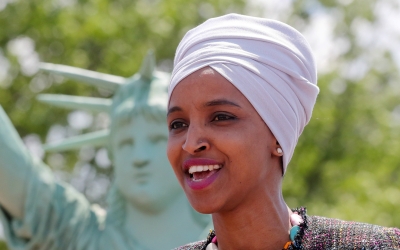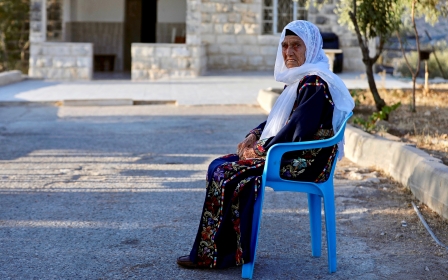Trump accused of antisemitism over Jewish 'disloyalty' comments

US President Donald Trump has been accused of using an antisemitic trope after saying Jews who supported the Democrats showed "great disloyalty".
Speaking at a press conference about two Democratic congresswomen who were barred from Israel and Palestine, he said he "couldn't believe" there was any discussion of cutting off aid to Israel after the country refused entry to Ilhan Omar and Rashida Tlaib, who is of Palestinian descent.
"Where has the Democratic Party gone? Where have they gone where they're defending these two people over the State of Israel?" he told reporters.
"I think any Jewish people that vote for a Democrat - it shows either a total lack of knowledge or great disloyalty."
His comment provoked anger from Jewish organisations who said the president was propagating an antisemitic trope that implies Jews are not loyal to their home state.
Halie Soifer, executive director of the Jewish Democratic Council of America, said the comments were "yet another example of Donald Trump continuing to weaponise and politicise antisemitism".
"If this is about Israel, then Trump is repeating a dual loyalty claim, which is a form of antisemitism," she added.
Jonathan Greenblatt, CEO of the Anti-Defamation League, also criticised the comments on Twitter.
"It's unclear who [Trump] is claiming Jews would be 'disloyal' to, but charges of disloyalty have long been used to attack Jews," he said.
"As we've said before, it's possible to engage in the democratic process without these claims. It's long overdue to stop using Jews as a political football."
However, the Republican Jewish Coalition defended the comments on Twitter, agreeing that it showed a "great deal of disloyalty to oneself to defend a party that protects/emboldens people that hate you for your religion".
Following the outcry, Trump quoted right-wing radio show host Wayne Allyn Root on Twitter as describing the president as being loved by Israelis "like he’s the King of Israel".
Boycott ban
On Monday, Omar urged the US to condition aid to Israel on the country ending the expansion of Jewish settlements in the occupied West Bank and its rights abuses against Palestinians.
The comments came after Israel's decision to bar her and Tlaib from entering the occupied Palestinian territories, which they had intended to visit on a congressional delegation.
Both Omar and Tlaib have previously expressed support for the Boycott, Divestment and Sanctions (BDS) movement, which seeks to apply international pressure on Israel to change its policies.
A law passed by the Israeli Knesset in March 2017 bans entry to the country for anyone making a "public call for boycotting Israel" or "any area under its control".
"We must be asking - as Israel's ally - the Netanyahu government [to] stop the expansion of settlements on Palestinian land and ensure full rights for Palestinians if we are to give them aid," Omar said on Monday at a news conference in Minnesota, alongside Tlaib.
Although Trump has sought to establish himself as the most avowedly pro-Israel president in years, he has come under fire before for conflating American Jews and Israelis.
During a speech to Jewish Republicans in April, Trump referred to Israeli Prime Minister Benjamin Netanyahu as "your prime minister" when addressing the attendees.
US Jews overwhelmingly vote for Democratic candidates in elections, which Trump has also criticised. According to CNN, Jewish Americans voted for the Democrats by roughly a 3:1 margin in the 2018 midterm elections
“How the hell did you support President Obama?” he asked the audience in April, despite the group being composed of Jewish Republicans.
“How did you do it?”
Middle East Eye delivers independent and unrivalled coverage and analysis of the Middle East, North Africa and beyond. To learn more about republishing this content and the associated fees, please fill out this form. More about MEE can be found here.






